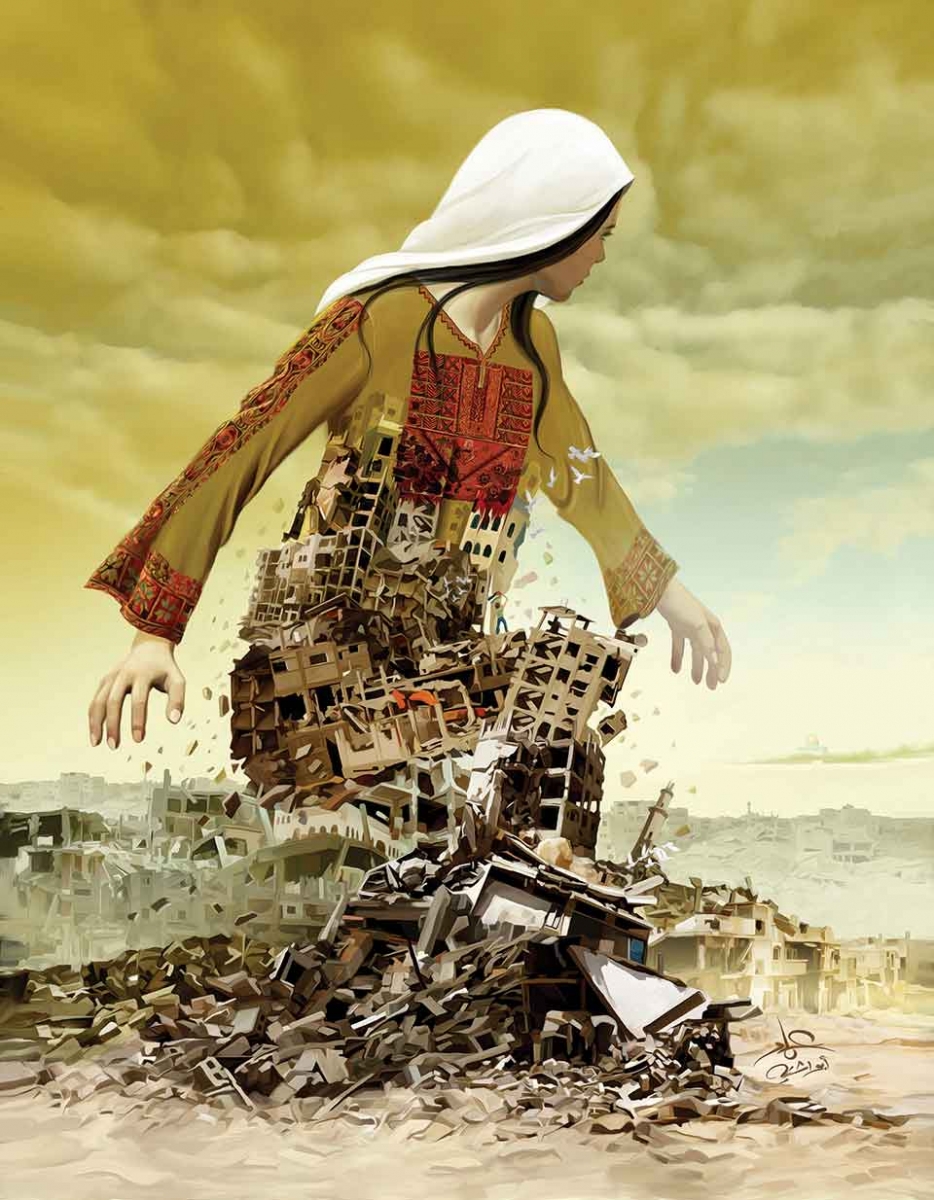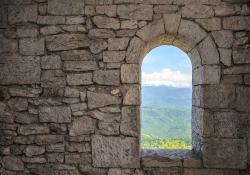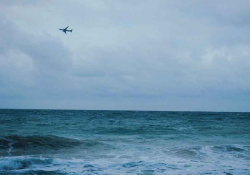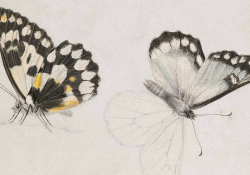Late Olives

Maybe this very morning
is suitable for forgetting you
and forgetting once and for all
your flowers and gardens
Maybe this doorstep
is suitable for a cool greeting
with no jasmine or horses to follow
where death grows in the corridors
and the springs dry in their songs
where metal hides the innocence of birds
and freedom becomes like a deer
hunted down like a whore
Maybe the window right now is ready
for darkness and stabbings
as the house flowers are in full bloom
to witness the massacre
where the word barely breathes
under the cycle of centuries
and suffering shines with its ornament and scandals
where the breathing of the walls rises
in the presence of gunpowder
and night stars become as dry as graveyard grass
❏
A splendid funeral approaches
and a ready race to crown the metal
so pass by O woman like a tree
in the forthcoming fires
and try to make your green less alluring
lest the metal notice your hidden secret
Pass by and wave to the poplars
at the far end of the valley
and the cypresses that follow oblivious
the footsteps of their forefathers in the steppes
Pass by and hug your orphan love
and the grass of your memories by the lake
Pass by like a blade running away from a crime
before it is committed
or a song that hasn’t yet seen daylight
Pass by like fake wine
that never felt the branches of a vine
or fences that disturb the bliss
of the serene grapevine
Pass by like an elegy in readiness for future victims
or a blind kite in the wasteland of loneliness
Pass by like some midday fallen out of a missile
or cold ashes remaining after the Bedouins departed
Pass by like the foot of a mountain shy of its dryness
or a summit decapitated by the bloody scenery
❏
Soon the tanks will appear with their innocent dusty colors
Soon the airplanes will court like doves
Soon
flint will ascend the throne
and daggers will advance assured of their acquittal
Soon
the serpent will relinquish its role
and the beasts of the wild will leave
our flesh to the machines
Soon
everything will end
and the rubble will announce freedom for fangs
and conspiracies will smooth their way to blood
Soon
poems will flee for their lives from the ink
before the pavement’s shadow
and marble will plunge its sword into the spirit
. . .
The night appears like some eternal mourning
for what the metal has in store for these creatures
The sun seems like an eye that cannot sleep
while the elements lie in mountain folds
ready to devastate the calm
and the racing visions in the merriment of butterflies
where the murderers cross the streets
unabashed by the fall of their masks
❏
Rise then, O woman
Maybe it is time to dry your flowers
and clear the atmosphere of the birds and their essence
for the heart seems to shrivel up
and your eyes will not be wide enough to take in those killed
Don’t run like a wild desert
in the horses’ imagination
or like a confident woman in the arms of a lover
whose windows are lit with passion
Don’t run now
Be gentle with your willow branches
trimmed for weddings
and confused with his amputated arms
Don’t stand in front of the window displays
looking at your image
Don’t ask for two flowers from the flower seller
Don’t confidently tease the fields with your breasts
or your eyes in the presence of vision
Don’t let your hair down more than you should
or become too sweet amid the amazement
of streets still shaking
from passing armies
And don’t be liberal with your questions
like a child with curious eyes
or those killed in search of innocence
as the blade glides on
❏
As I surrender my blindness to the night
I cross the road and forget two massacres
so that your smile remains unfrozen
and the desert continues to rejoice in the strength of its cactus
I conjure my frail presence
from the muzzles of guns and the likelihood of quietly being scattered on the pavement
I pass like a miracle between two policemen
who are in search of your scent and the sea in me
I am burdened by clouds gone astray on their way to the fields
and birds that have yet to discover their wings
and slave girls who admire their faces
in ladies’ mirrors
forgetting how loud they snore
under kitchen tables
Thus I generated applause
by raising my silence to a cosmic deafness
and guarding my seeds
❏
Complete nakedness covers the towns
leaving them exposed to defeat
Street benches made heavy with the isolation of their inhabitants
and plants creeping to the desert
write their wills
The lemon might tell me
what the figs have not
and olive trees save up light
to overcome the darkness of their sky
The grapes might suppress their joy
in the presence of old men
and oak trees end their days without memories
The wind might muffle its bells
among the elder trees
as the cypress draws out its soft sway
from a freezing sky
The wheat might distribute its prayers
upon some dark songs
and flowers set out to wither
on garden fences
As for the palm trees
their advice to me
towers too high
❏
So pass like a palm tree
or a late olive tree
❏
Let’s assume we are beyond the seen
beyond blood inheritance
beyond men’s weapons
Let’s say we are beyond the panting wounds
beyond the scandal’s light
as it searches through the souls of the victims
looking for their little secrets
and dreams . . . after the raids
Let’s say we are beyond the mulberry’s bewilderment
at all this nakedness
and beyond the high threshing floor
under siege by the supplication of starvation
Let’s say we are beyond a land
that leans toward its ending
And planets that will find no other planets
when they die
. . .
But . . . who can extract what’s in your eyes
and who can erase your blood from my veins?
Who can soothe your throat
from its eternal scream . . . and my song?
Who can keep my hands from their mad dreams
about the narcissus of life?
❏
Space has not turned its face away to our door
and the wilderness never once pulled
the rug of the horizon from our travels
toward the green
where foxes rush
over the backs of conspiracies
that gather us in the cities
where there’s no wind to carry our calls for help
and no rivers
where ceilings are made to break our stature
and windows are too narrow to receive two dreams
where the horses behave
more like chickens
and hands with their wounded modesty
stand before the accounting windows
where the master can count his sheep
as he pleases
and select the whiteness of tasty rabbits
for his evening table
where silk curtains gloat over our loins
as they strip us of our mulberry leaves
and where stables look out onto factory smoke
and prison doors
❏
We were unable to run away from the city
Instead we ran inside it
❏
There’s a forest at the corner
a desert in the public square
snow atop the dome of parliament
a cave at home
a hole in the head
to reassure bullets and generals’ laughter
There’s a horizon nibbled by mice
and cold pale moons
a sea chewed by submarines
with towers diminishing its blue solemnity
a river asking direction from a floating corpse
that misdirects it
and an eagle begging its final prey
to fly with him
before zoos take over
Metal invaders gather under the windows
to trap the dawn
Tyrants ambush dreams
in the heart of the lyre
and incite unborn children to kill their mothers
Everything has been perfectly arranged
so that you can easily reach the promenade
and watch a child being raped
from the window of your car
or from atop a policeman’s shoulders
and for those who reserved their seats
two wars ago
everything has been arranged:
the secret pathways for the killer
the mass graves for the victims
where humans fall naked into darkness
stripped of the simplicity of their names
Everything has been arranged to strike down the earth
and pluck its feathers
and the cockerels’ obstinacy
Everything has been arranged
to roll its oaks
towards the frail legumes
and ride its horses
into the bleating kingdoms
and transform shelters into coal mines
❏
I will shake the hand of the general
on his way to war
hoping he would not return
I will shake the hand of the killer
on his way to the crime
hoping he would die before he arrives
I will shake the hand of the song
on its way to dawn and sing
so that its voice remains
clean from tanks
I will shake my own hand
to reassure my poem
that we are not alone
❏
Hey sir,
kind sir
who collapsed under the kindness of your heart!
Hey sir,
The bullet whispers . . .
Fire me
Hey sir,
kind sir
who is burdened by children’s rejection across the oceans
fire me
Hey sir,
kind sir
with your spaceships
and high thrones
on the backs of the bombers
Hey sir
who is unsheathed like the shields of liberty
and volcanoes
Fire me in the wind of the sweetness
that streams from what they call innocence
and bestow on me the secret of incarnation
to gather the corpses that have no mercy
on the paving stones
with their night wailing
Hey sir,
kind sir
pierced by rejection
wrapped in the threads of apprehension
I am the bomb
Fire me
to spell out their destruction and the dryness of their villages
to raise it anew into
a white space that doesn’t scratch the range
Fire me
to stitch the swans for you
with the threads of faraway shores
those forlorn shores
under pretense of hunger and prisons
Hey sir,
Kind sir
afflicted by some cosmic wisdom
your heart breaking over the wretchedness of clay
Fire me
at a crazy noon in the obscurity of their forests
and the dullness of their deserts
Fire me . . . O sir
to wrap their mornings
and the night dew on their children’s faces
who sleep on the rooftops
with the smoke of your explosives
Fire me so I can shake their structures
and the bosoms of their horselike young women
causing them to fall down panting
Fire me into the obscenity of their wombs
and their blue secrets
that imitate the sky of your white houses in the capitals
Fire me
and bestow upon my splinters
their everlasting dream
of watching their windows fly
and their flesh clinging to the walls of the horizon
Fire me
before my gunpowder turns white!
❏
I reflect upon the loneliness in the room
and the dark moth under the door
and between the window cracks
I reflect upon the writing table
where my poems turn old, burdened by hallucinations
I reflect upon a book open onto the ends of the street
and on human words
that cross the streets without legs
in search of the voice of a dream
I contemplate their limbs in rivers of ink
and their heart, kneaded
with the daring eyes of the killed
I contemplate your absent face in the mirror
and gather what hair you left
between the teeth of the comb in the morning
and scream out in longing for your waist
with all my hungry desert:
Don’t come now . . .
Don’t come now . . .
What need could I have for another dead person?
What need could I have in this cold?
What need could I have for a gazelle that will not reach the bend?
What need could I have for breathless air
Before the conversation starts?
What need could I have for a hand that has turned ashen
before it reaches my hair
And arms extinguished before the rubble is swept away?
What need could I have for more prisoners of war
in this adversity
or more shadows in this darkness?
Don’t come now
Don’t come now
. . .
I arrange darkness neatly, like a bat
and my labyrinths with the wisdom of the mole
I convince the ceiling that it is no longer raised
And cunningly ask the wall:
Where are your brothers?
And whisper to the door:
Are you awaiting someone in this bareness?
I tell the window
What sort of miracle can raise you
in the air without a frame?
I let loose the conspiracy of the killed
in the cold surroundings
and laugh amid the quarrels of the inanimate
The window will become distant
and the wall will lean down
The door will cry over its isolation
and the ceiling will find an abyss beneath it
called a human being
and fear
And I will laugh like someone killed
by a late bullet
passing through cold flesh
and I will go out
in this manner
filled with loneliness
like a crazed bridge over a desert
in order to cry out one more time:
Don’t come now
Don’t come now
Translation from the Arabic














